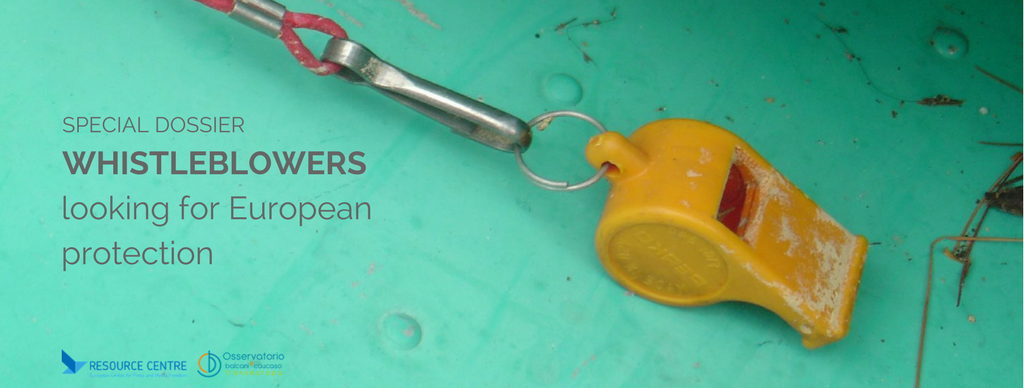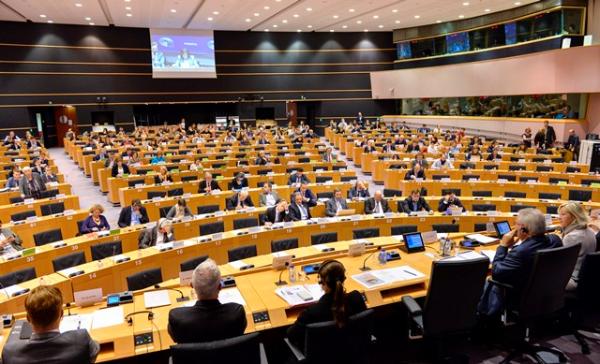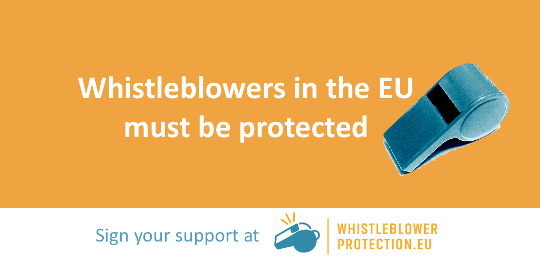Update: On October 7, 2019 the Council of the European Union formally adopted new rules on whistle-blowers protection. The new rules will require the creation of safe channels for reporting both within an organisation - private or public - and to public authorities, and provide a high level of protection to whistle-blowers against retaliation. Member states will have two years (till October 2021) to transpose the new rules into their national law.
These new rules are based on the Proposal for a Directive adopted by the European Commission on April 23, 2018 and approved by the European Parliament April 16, 2019.
The pressing need to grant legal protection to whistleblowers by adopting framework rules at the EU level gained momentum following scandals uncovered by whistleblowers. The most notable cases which brought the topic to public attention include the Lux Leaks affair involving tax avoidance schemes (2014), the so called “Panama Papers ” that provided detailed financial information on thousands of offshore entities (2015), and the Russian doping scandal before the 2016 Olympic Games.
Whistleblowing has been widely recognised as a tool against corruption and fraud: a recent study on the economic benefits of whistleblower protection in public procurement in the EU finds a robust economic case for establishing mechanisms of whistleblower protection, as their costs are far lower than their expected benefits. At the same time, protection of whistleblowers is essential to secure the conditions for investigative journalism : the ongoing erosion of the protection of journalistic sources is identified as one of the main threats to media freedom across the world.
Despite the fact that whistleblowing is essential for public interest, most of those individuals who decide to speak up do so at their own peril, suffering professional and personal costs . The rules that are supposed to protect them are often overridden by national security and anti-terrorism laws, while the digital era poses new challenges relating to data retention and encryption.
State of the art at the European Union level
Over the past decade the European Parliament acknowledged the need to act on whistleblowing, repeatedly calling on the European Commission to put it on the EU agenda.
After that all the main international organisations comprising the EU countries have recognised the democratic urgency of providing protection and support to whistleblowers, the European Parliament finally approved a Directive on April 16, 2019.
This dossier, which combines a selection of contents gathered in the Resource Centre on Press and Media Freedom curated by OBC Transeuropa , provides an overview of the 3-year-long process at the EU level.
Strasbourg standards
In the absence of a EU framework, national regulations protecting whistleblowers vary significantly across European countries , causing relevant legal gaps: some member states protect whistleblowers through anti-corruption laws; others regulate the issue through public service laws; others through labour, criminal, or sector-specific laws.
This is why the case law of the European Court of Human Rights (ECtHR) has played a key role in setting and expanding standards of protection for whistleblowers, together with the guiding principles formulated by the United Nations to help countries design their legal frameworks for the protection of whistleblowers.
To decide on whistleblowing cases, the European Court of Human Rights refers to the right to freedom of expression as granted by Article 10 of the European Convention on Human Rights, which protects the freedom “to impart information and ideas without interference by public authority and regardless of frontiers” and foresees restrictions in some exceptional cases. In whistleblowing cases, this restriction may concern legal interests such as the right to privacy, reputation, and super-individual interests such as national security. In any case, the Court must assess whether a restriction to free expression is “necessary in a democratic society”. In order to do so, a six-part test was developed.
The six-part test assesses:
1) the existence of alternative channels to disclose the information
2) the public-interest character of the disclosed information
3) the authenticity of such information
4) the possible damage suffered by the public authority
as a result of the disclosure5) whether the applicant acted in good faith
6) the severity of the sanction
In recent cases, the Court confirmed and expanded the recognition of the importance of protecting whistleblowers, promoting higher levels of protection than those recognised by the national courts.
With the landmark ruling Guja vs. Moldova (2008), the Court recognised that the right to impart information had been violated when Mr. Guja, a public servant at the Prosecutor General’s Office of Moldova, was dismissed from his position after revealing a corruption attempt targeting the judiciary. This ruling emphasised that rights granted by Article 10 extend to public servants and workplace matters, and that harsh sanctions should be avoided because of their potential chilling effect. Disclosure of information was recognised as legitimate in this case, bearing on the fact that it represented the only available option to protect the public interest.
Again, in Bucur vs Romania (2013), the ECtHR held that a whistleblower’s conviction for disclosing classified information to the press violated the right to freedom of expression, notwithstanding the fact that the case involved national security and secret services.
A positive stance towards the protection of whistleblowers also emerged in cases concerning journalistic work: in Matúz vs. Hungary (2014), the Court held that a journalist who disclosed government censorship on a public broadcaster acted in “good faith” and could not thus be fired, as this would have violated his freedom of expression. Again, in Görmüş vs. Turkey (2016), the Court gave primacy to the protection of journalistic sources of information, condemning the government’s raid of the magazine Nokta in search of the files provided by the whistleblower.
The positive role that the Strasbourg Court has played so far in support of whistleblowing seems to have been fading in more recent judgements: as highlighted by professor Dirk Voorhoof, “worrying trends” emerged recently, including the fact that the Court has been denying protection in case of unfounded allegations of crime (i.e. not found to be a crime by the judiciary at a later time).
The role of the Strasbourg court remains crucial, as well as the dialogue between the ECtHR and the media freedom community. In March 2017, the ECPMF conference went in this direction by creating a space for debate on Article 10 and best practices for protecting freedom of expression, including whistleblowing.
Towards a regulation at the EU level
In recent years, after the WikiLeaks earthquake in 2006, other cases demonstrated the fundamental role of whistleblowing worldwide. A 2017 study commissioned by the European Parliament’s Committee on money laundering, tax avoidance, and tax evasion assessed the impact of the schemes revealed by the Panama Papers on the EU. Notably, it recommended to protect whistleblowers with special and support measures both at the national and EU levels.
As pointed out by journalist Kristof Clerix, the lack of legal protection for whistleblowers forces them to remain in the dark for years. Similarly, as mentioned by the President of the European Federation of Journalists (EFJ), Mogens Blicher Bjerregård, “Antoine Deltour and Rafaël Halet – the whistleblowers behind the LuxLeaks case – got punished when they should have been protected and praised for what they did”.
Common European provisions on whistleblowing protection could be developed on the basis of the Article 325 of the Lisbon Treaty, that establishes an ordinary legislative procedure to elaborate norms to tackle fraud within the EU and member states. As noted by Pamela Bartlett Quintanilla, who follows the topic for the Greens/EFA group in the European Parliament: “The presumed absence of legal guidelines is the reason European institutions normally give when there is no political will to tackle a particular issue. In fact, the legal framework is there, and it is founded on the need to protect the internal market from distortion and to protect working conditions for whistleblowers against possible retaliation by their employers”.
In October 2013, by voting a Resolution on organised crime, corruption and money laundering, the Parliament had already asked the Commission to submit “a legislative proposal in the public and in the private sector” by the end of the year. Two years later, voting a Resolution on tax rulings in response to the LuxLeaks scandal, the Parliament explicitly recognised the role played by the International Consortium of Investigative Journalists, stressing the importance of both whistleblowers and journalism in building a fully democratic society:
“It is not acceptable that citizens and journalists can be subject to prosecution rather than legal protection when, acting in the public interest, they disclose information or report suspected misconduct, wrongdoing, fraud or illegal activity”.
Mindful of the role that “investigative journalists, the non-governmental sector, and the academic community” may have in exposing cases of tax avoidance and informing the public, the Parliament called on the Commission to propose a EU legislative framework for the effective protection of whistleblowers “by June 2016”.
As the Commission kept postponing its initiative, the Greens/EFA group in the European Parliament took the lead and worked independently on a draft directive: “Whistleblower protection in the public and private sector in the EU”. Presented to the MEPs on May 4th 2016, this draft proposal was prepared by a team of academics, legal experts, and activists close to the Greens and included an online consultation.
On its part, European civil society took initiative as well. In June 2016, a coalition of trade unions, NGOs, and journalist organisations – including Eurocadres, Transparency International, the Whistleblowing International Network, and the European Federation of Journalists – launched the campaign “Whistleblowers need EU protection”.
In November 2016, the European Commission's Annual Colloquium on Fundamental Rights focused on media pluralism and democracy, bringing together national and EU policymakers, international and civil society organisations, journalists, academics, and legal practitioners. Discussions were not confined to whistleblowing, but stemmed from the results of a special Eurobarometer survey on media pluralism and democracy, which made it clear that no EU Member State is free from risks related to media freedom. In March 2017, encouraged by parliamentary initiatives, the Commission DG for Justice and Consumers launched an online consultation on whistleblower protection – whose results are published here – in order to “collect information, views and experiences on the benefits, on the drawbacks and on problems arising both at national and EU level from the divergences of protection across the EU”.
Meanwhile, on October 23rd-24th, 2017, the plenary session of the European Parliament discussed the draft report on “Legitimate measures to protect whistleblowers acting in the public interest when disclosing the confidential information of companies and public bodies”. It was a motion for a resolution, i.e. a non-binding act (the European Parliament cannot launch legislative initiatives on its own), drafted by French radical Virginie Rozière (S&D).
The proposal adopts a broad definition of whistleblowing, covering any kind of disclosure of information in the public interest made by people working both in the private and public sector. The notion of employee included in the document extends to contractors, trainees, and former employees. According to the motion, whistleblowers should be free to use different channels to disclose information: beside dedicated internal channels within their enterprise or institution, they could directly contact the press or civil society organisations, even on condition of anonymity. The motion calls for the provision of psychological, legal, and financial support to whistleblowers, who should be protected against and compensated for any form of retaliation. On the contrary, sanctions should be introduced for those who obstruct their revelations, and in case of alleged retaliation the burden of proof should lie with the employer. Finally, each member state and the EU itself should establish independent bodies to collect and monitor whistleblower reports.
All the members of the parliamentary Committee on Legal Affairs had voted in favour of Rozière’s proposal, except for the European People’s Party (abstained) and the European Conservatives and Reformists (against) – a similar breakdown was registered in the plenary session, where the motion was passed with 399 votes in favour, 101 against, and 166 abstained. The European People’s Party is skeptical on anonymous reporting, on the possibility of reporting directly to the press, and on the reversal of the burden of proof. In view of the parliamentary debate, the Socialists and Democrats group had released a video in order to raise awareness about the difficulties a worker can encounter after her or his decision to reveal information in the public interest.
During a conference on “Defending journalists” organised in Leipzig by the European Centre for Press and Media Freedom (ECPMF) in late 2017, Green MEP Benedek Jávor rhetorically asked why the Commission seems to be reluctant on such a crucial issue; speaking on behalf of the Commission, the officer of DG Justice Georgia Georgiadou stated that the Commission is working on a “balanced proposal” to protect “responsible whistleblowing”: “We will use the momentum, we are welcoming all ideas and expertise on a difficult issue, and the next year we’ll probably see the first results”.
Indeed, a Proposal for a Directive on the protection of whistleblowers was adopted by the European Commission on April 23, 2018. Consistently with the ordinary legislative procedure, the European Parliament (in December 2018) and the European Council (in January 2019) reviewed and amended the text. On April 16, 2019, the EU Whistleblower Protection Directive was approved by a overwhelming majority at the European Parliament and on October 7, 2019 the Council of the EU formally adopted the new rules. The Directive affords harmonisation among EU countries, that will have two years (till October 2021) to transpose it into national laws.
Meanwhile, beyond EU borders...
In candidate and potential candidate countries of the Western Balkans whistleblowing is becoming more and more relevant in the public debate. Albanian, Bosnian, Kosovar, Macedonian, and Montenegrin organisations gathered in the Southeast Europe Coalition on Whistleblower Protection in order to promote free expression and fight corruption.
In recent years, whistleblowing had a central role in the illegal wiretapping scandal that led to the political crisis in Macedonia – in the wake of that case, a comprehensive whistleblower law was adopted in the country in 2015. In Serbia, the law on whistleblower protection was approved in November 2014: a working group including non-governmental representatives, state officials, and whistleblower themselves participated in the drafting. Kosovo has also started to discuss the role of whistleblowers and the improvement of the current national law. Considering the indicators on media freedom, journalists’ safety, and employment conditions of journalists in the Western Balkans, much needs to be done to improve the conditions for press freedom. In this respect, even though not legally binding, the adoption of a EU directive would probably have a positive impact in the enlargement region too.
No single answer
According to the 2017 World Press Freedom Index, the erosion of media freedom is particularly visible in Europe. Security measures and pervasive surveillance threaten to jeopardise journalism’s watchdog role in Europe. Interference, surveillance, and fear of negative consequences push more and more European journalists towards self-censorship. The same seems to be valid for whistleblowing, with the 2016 LuxLeaks verdict representing a negative case for the protection of whistleblowers and, consequently, of investigative journalism.
The discussion is now open at the European level: how to protect sources in the digital age? There is no single answer, because the hardships a whistleblower might have to face are multifaceted, as are the dilemmas in balancing their freedom of expression with the legitimate rights and concerns of other actors involved. In order to protect whistleblowers and upgrade freedom of expression, a EU initiative in their favour will be decisive. To effectively protect their freedom and reap the benefits of their disclosures, additional initiatives and attention are needed on the part of other public institutions, civil society actors, and public opinion.
Tags: Whistleblowing Investigative journalism Access to information European policies and legislation EU Member States Rule of Law
This content is part of the Media Freedom Rapid Response (MFRR), a Europe-wide mechanism which tracks, monitors and responds to violations of press and media freedom in EU Member States and Candidate Countries. The project is co-funded by the European Commission.





